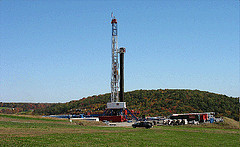Webinar on Marcellus Shale natural-gas trends offered on April 21

The webinar on April 21 will cover the latest trends in Marcellus shale gas-drillig leases, royalties and production.
UNIVERSITY PARK, Pa. — The latest trends in Marcellus Shale natural-gas leases, royalties and production will be discussed by experts in a Web-based seminar April 21, sponsored by Penn State Extension.
Les Greevy, of Greevy and Associates in Williamsport, Pa., and Kris Vanderman, of Vanderman Law in Charleroi, Pa. — both firms that specialize in representing clients with Marcellus Shale natural-gas interests — will make presentations in the webinar.
“We started with Extension in 2005-06, doing educational programs for landowners, and we represent many people with gas-drilling leases,” Greevy said. “We have been dealing with issues such as going from the lease stage to the production stage, estate planning, protecting assets and tax issues.
“A lot of leases are starting to run out, so we are starting a whole new cycle of leases. We’ll be discussing that, as well as pipeline-property issues and trends in contract addenda, royalty payments and cash-bonus payments.”
Greevy noted that business dealings with gas-drilling companies have changed somewhat in northcentral Pennsylvania. “The trend that we are seeing now in leasing is less competition between companies,” he said. “Previously you had any number of companies competing for leases and there was rapid growth in leasing.
“Now, the gas companies have pretty much staked out geographic areas that they’re interested in and are not competing quite as much, and as a result, prices are down a little, and the ability to get protective addenda in leases is diminished.”
Vanderman, whose firm represents only individuals and groups with land to lease — and never the gas-drilling companies — has seen the same kind of consolidation in leasing by the companies in the state’s southwestern corner. And he also has witnessed a similar resulting drop in lease payments to and leverage for landowners.
“Right now, there is an active swapping of leases between companies, and they are carving out their territories,” he said. “You have companies that are more or less dominant in areas,and this consolidation of territory by lease swaps or farm-out agreements is ongoing.”
Regarding the trend towards landowners having less ability to insert protective addenda into leases, Vanderman indicated that companies from out-of-state now appear less flexible than they had been when the Marcellus play was newer in Pennsylvania. However, in the southwest there are two “home” companies, EQT and CNX — the third, Atlas, was just aquired by Chevron — that help keep competition in play, which is helpful for some landowners depending on geography.
“I can say unequivocally the hand of Texas is revealed,” he said. “Some of the newest ‘standard offer’ leases are extraordinarily — even dramatically — favorable to the interests of the lessee gas companies. The issue here is, what is a landowner willing to concede for money?”
Vanderman noted that, during the webinar, he intends to also talk about environmental progress that has been made voluntarily by operators in the southwest part of the state. “That includes on-site water-treatment systems that have been implemented, recycling of flowback water from fracking operations and installation of underground water-piping systems to remove truck traffic from the roads,” he said.
The webinar is part of a series of workshops and events addressing circumstances related to the state’s Marcellus Shale gas boom. Information about how to register for the webinar is available on the webinar page of Penn State Extension’s natural-gas website.
< http://extension.psu.edu/naturalgas >
Future webinars will include speakers on the following topics: the impacts of the natural-gas industry on landfill operations; air quality issues related to unconventional gas plays; a research update on the effects of Marcellus Shale drilling on wildlife habitat; and current legal issues in Marcellus Shale development.
Previous webinars, publications and information on topics such as water use and quality, zoning, gas-leasing considerations for landowners and implications for local communities also are available on the Extension natural-gas website.
For more information, contact John Turack, extension educator in Westmoreland County, at 724-837-1402 or jdt15@psu.edu.
Friday, April 8, 2011
http://live.psu.edu/story/52684#nw69
